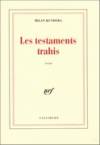Les testaments trahis
 Milan Kundera, Les testaments trahis, Paris, Gallimard, 1993, 324 p.
Milan Kundera, Les testaments trahis, Paris, Gallimard, 1993, 324 p.
« Madame Grandgousier, enceinte, mangea trop de tripes, Si bien qu’on dut lui administrer un astringent ; il était si fort que les lobes placentaires se relâchèrent, le foetus Gargantua glissa dans une veine, monta et sortit par l’oreille de sa maman. Dès les premières phrases, le livre abat ses cartes : ce qu’on raconte ici n’est pas sérieux : ce qui veut dire : ici, on n’affirme pas des vérités (scientifiques ou mythiques); on ne s’engage pas à donner une description des faits tels qu’ils sont en réalité. Heureux temps de Rabelais : le papillon du roman s’envole en emportant sur son corps les lambeaux de la chrysalide. »
(Extrait, Éditions Gallimard, 1993, incipit)
Documentation critique
GALLAGHER, Mary, « Connection Failures: Discourse on Contemporary European and Caribbean Writing in French », Small Axe: A Caribbean Journal of Criticism, n° 33 (novembre 2010), p. 21-32. +++ Article de revue
### Abstract
Milan Kundera’s claims In L’Art du roman (1986) that the European novel subsumes the American novel are implicitly contradicted by Édouard Glissant’s study of ‘le roman des Amériques’ in Le Discours antillais (1981). In Les Testaments trahis (1993), although Kundera relativizes the European novel with reference to the ‘novel of the South’ (exemplified by Chamoiseau and Rushdie), his view of the latter still shows no awareness of Glissant’s connection of a poetics of Caribbean and Alter-American ‘self-recovery’ with a perspective on world-wide cultural diversity and relationality. If Kundera’s theorization of the (globalized) European novel is vitiated by its ignorance of the critical ground covered by Caribbean thinkers, equally the manifesto in favour of ‘une litteacute;raturemonde’ -surprisingly signed by Glissant (Le Monde, 2007) - also distorts the complex interconnections of European and non-European writing. These connection failures illustrate both a short-circuit in the (supposedly) global transmission of critical thought, and an inadequate understanding of the notion of the ‘world’ when conjugated with the term ‘literature’.
Gallagher, 2010, PDF ###
BISSONNETTE, Annie, « Milan Kundera essayiste ou l’art du paradoxe », mémoire de maîtrise, Faculty of Arts, Université d’Ottawa, 1999, 110 f. +++ Thèse de doctorat / mémoire de maîtrise
###Résumé (Amicus)
« Le rayonnement des romans de Milan Kundera aura laissé dans l’ombre ses deux essais. Condamnés à servir de commentaire à son art du roman, on a négligé de les aborder dans leur spécificité. Cette étude propose donc une analyse esthétique de Kundera essayiste à travers le prisme de la thématique du paradoxe. Si Kundera romancier explore des possibilités existentielles dans le piège qu’est le monde, Kundera essayiste cherche à jeter un éclairage lucide sur nos mythologies modernes dans un monde envahi par le kitsch et la non-pensée des idées reçues. Avec un plaisir d’hérétique, c’est à titre de bouffon intellectuel que Kundera nous convie à cet appel au questionnement qu’est l’essai en reprenant le stratagème favori des humanistes de la Renaissance, le paradoxe. Il s’agira d’explorer les différents mécanismes, la variation, la pensée expérimentale, la carnavalisation et la redéfinition, de cette esthétique originale et scandaleusement paradoxale, qui vise à nous ébranler “poétiquement”. »###
GOETZ-STANKEWICZ, Marketa, « Kundera’s Sacred Cows and Bêtes Noires », dans Peter PETRO (dir.), Critical Essays on Milan Kundera, New York, G. K. Hall, 1999, p. 242-254. +++ Chapitre de collectif
SADOW, Jonathan, « The nostalgia for novelty: Revivals of the eighteenth century novel, genuine and spurious », thèse de doctorat, University of Massachusetts Amherst, 2004, 247 f. +++ Thèse de doctorat / mémoire de maîtrise
### Abstract
Revivals of the eighteenth century novel and revivals of material culture are closely related. Whether one is mourning the lost bagel of the past or the lost novel, a complex form of nostalgia is at work. Historians of the novel Ian Watt, Michael McKeon, J. Paul Hunter, Lennard Davis, and many others are participants in the continuous re-invention of an invented tradition. Similarly, a number of novelists, reviving a great deal of eighteenth century discourse on genre, historiography, and aesthetics, partake of a nostalgia for novelty, a lost time when the European novel might truly have been novel. While these invented histories both need and oppose each other, neither are historical. The twin ideologies are revivals of a complex set of ambivalent metaphors and narratives that were parables of loss, regret, and repetition in their original form. The nostalgic fatalism of the past is recycled into the fatalism of the present, transforming that fatalism into a form of optimism. I trace the journey of this metaphor through Pierre Marivaux’s Pharsamon, Henry Fielding’s Tom Jones, Laurence Sterne’s Tristram Shandy, and Denis Diderot’s Salon de 1765 and Jacques le fataliste. Simultaneously, I discuss its revival in Thomas Pynchon’s Mason and Dixon, Susan Sontag’s The Volcano Lover, Robert Glück’s Jack the Modernist, Salman Rushdie’s Midnight’s Children, and Milan Kundera’s Les testaments trahis. I employ both folklore studies–Neil Rosenberg’s Transforming Tradition and Richard Handler and Jocelyn Linnekin’s “Tradition: Genuine or Spurious”–and the genre theory of Gerard Genette, Philippe Lacoue-Labarth, and Jacques Derrida to extend discussions of nostalgia in Susan Stewart’s Crimes of Writing and Svetlana Boym’s The Future of Nostalgia. Finally, I suggest that many traditional debates and distinctions–novel and romance, realism and self-consciousness–are spurious rather than genuine.
La version PDF de la thèse est disponible pour les membres de communautés universitaires qui ont un abonnement institutionnel auprès de UMI - Proquest ###
| Les testaments trahis (oeuvre) | |
|---|---|
| Titre | Les testaments trahis |
| Auteur | Milan Kundera |
| Parution | 1993 |
| Tri | testaments trahis |
| Afficher | oui |